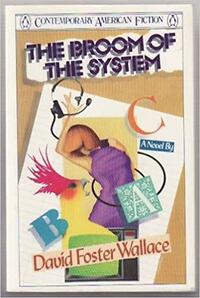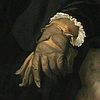Take a photo of a barcode or cover
Con Wallace vorrei poter dare un parere estremo, dato che mi sembra sia un autore che o si ama o si odia.
La verità è che The Broom of the System, pur avendo dimenticato qualsiasi cosa sapessi di Wittgenstein e Derrida dai tempi del liceo e dell’università, l’ho apprezzato molto a un livello immagino superficiale: Lenore crede di non esistere al di fuori di quello che viene detto su di lei, la sua bisnonna e altri residenti della casa di riposo in cui vive si sono volatilizzati, il suo ragazzo ossessivo e geloso le racconta le storie che vengono sottoposte in casa editrice e il suo pappagallo viene scambiato per un nuovo messia.
Insomma, fantastico.
È tutto assurdo, dalla storia vera che rimane sullo sfondo ai siparietti con lo psicologo mentecatto, dalle coincidenze improbabili a un uomo obeso che mira a mangiare l’universo intero.
Mettiamola così: quello che ho capito mi è piaciuto; quello che non ho capito temo si estenda quanto il Great Ohio Desert. E il prossimo Wallace che leggo non sarà narrativa.
La verità è che The Broom of the System, pur avendo dimenticato qualsiasi cosa sapessi di Wittgenstein e Derrida dai tempi del liceo e dell’università, l’ho apprezzato molto a un livello immagino superficiale: Lenore crede di non esistere al di fuori di quello che viene detto su di lei, la sua bisnonna e altri residenti della casa di riposo in cui vive si sono volatilizzati, il suo ragazzo ossessivo e geloso le racconta le storie che vengono sottoposte in casa editrice e il suo pappagallo viene scambiato per un nuovo messia.
Insomma, fantastico.
È tutto assurdo, dalla storia vera che rimane sullo sfondo ai siparietti con lo psicologo mentecatto, dalle coincidenze improbabili a un uomo obeso che mira a mangiare l’universo intero.
Mettiamola così: quello che ho capito mi è piaciuto; quello che non ho capito temo si estenda quanto il Great Ohio Desert. E il prossimo Wallace che leggo non sarà narrativa.
What context? There’s no context. A context implies something that hangs together. All that’s happening now is that a thoroughly screwed-up life that’s barely hung together is now even less well hung together.
challenging
funny
mysterious
reflective
slow-paced
I can't say that I fully grasped it but I think I at least understood that it is worth grasping. The story explores the question of how things attain meaning. In accord with Wittgenstein he suggests that meaning is discovered in how a thing is used. "[S]omething's meaning is nothing more or less than its function ... Meaning as fundamentalness. Fundamentalness as use. Meaning as use" (149-150). This of course touches us deeply. We all desire. "[E]veryone has desires in their lives, that's part of the experience of what it is to be human in God's world" (461). And of course desires want to be satisfied. We are invited then to ask how those desires can be satisfied. "Tonight we must attempt to see together that to be satisfied in a spiritual sense is to be used" (465). We are satisfied in being used because use gives meaning. So I leave you with this: "Is not an individual who is a partner with God simply an individual who recognizes, and finds within his own soul the strength to perform, the function God has assigned to him? We must ask how can we be useful to God?" (465).
I’m not even sure what to say about this. I liked it, I think, but don’t recommend it? I thought it was as funny as it was disturbing as it was confusing as it was edifying as it was absurd? I’m not sure I even get it, but I kind of don’t want to? It has “Confederacy of Dunces” vibes for me, which is to say I get that Something Is Happening Here, but I don’t think it’s something for me. But it was good and possibly DFW was some kind of (problematic) genius?
lighthearted
mysterious
reflective
medium-paced
Plot or Character Driven:
Character
Strong character development:
Complicated
Loveable characters:
Complicated
Diverse cast of characters:
Yes
Flaws of characters a main focus:
Complicated
Probably not the place to start with DFW's fiction. He wrote it as a precocious and hella ambitious 24yr-old, and you can tell. Sprawling, scattered, often emotionally hollow, and still just amazing enough often enough to keep you slogging through the many didactic and thin dialogues about Self and Other and Membranes Between and Wittgenstein and blahdiblahdiblah. It's exactly the kind of plodding, over-written bildungsroman that gets branded as "promising". Somewhere, I feel sure, he cranked out fiction that is or is nearly the equal of his non-fiction. I'll find it.
Selections:
- "Words and a book and a belief that the world is words..."
- "At first you maybe start to like some person on the basis of, you know, features of the person. The way they look, or the way they act, or if they're smart, or some combination or something. So in the beginning it's I guess what you call features of the person that make you feel certain ways about the person. ... But then if you get to where you, you know, love a person, everything sort of reverses. It's not that you love the person because of certain things about the person anymore; it's that you love the things about the person because you love the person. It kind of radiates out, instead of in. At least that's the way ... That's the way it seems to me."
- "What she did with me--I must have been eight, or twelve, who remembers--was to sit me down in the kitchen and take a straw broom and start furiously sweeping the floor, and she asked me which part of the broom was more elemental, more fundamental, in my opinion, the bristles or the handle. The bristles or the handle. And I hemmed and hawed, and she swept more and more violently, and I got nervous, and finally when I said I supposed the bristles, because you could after a fashion sweep without the handle, by just holding on to the bristles, but couldn’t sweep with just the handle, she tackled me, and knocked me out of my chair, and yelled into my ear something like, ’Aha, that’s because you want to sweep with the broom, isn’t it? It’s because of what you want the broom for, isn’t it?’ Et cetera. And that if what we wanted a broom for was to break windows, then the handle was clearly the fundamental essence of the broom, and she illustrated with the kitchen window, and a crowd of the domestics gathered; but that if we wanted the broom to sweep with, see for example the broken glass, sweep sweep, the bristles were the thing’s essence. No? What now, then? With pencils? No matter. Meaning as fundamentalness. Fundamentalness as use. Meaning as use. Meaning as fundamentalness."
- "Words and a book and a belief that the world is words..."
- "At first you maybe start to like some person on the basis of, you know, features of the person. The way they look, or the way they act, or if they're smart, or some combination or something. So in the beginning it's I guess what you call features of the person that make you feel certain ways about the person. ... But then if you get to where you, you know, love a person, everything sort of reverses. It's not that you love the person because of certain things about the person anymore; it's that you love the things about the person because you love the person. It kind of radiates out, instead of in. At least that's the way ... That's the way it seems to me."
- "What she did with me--I must have been eight, or twelve, who remembers--was to sit me down in the kitchen and take a straw broom and start furiously sweeping the floor, and she asked me which part of the broom was more elemental, more fundamental, in my opinion, the bristles or the handle. The bristles or the handle. And I hemmed and hawed, and she swept more and more violently, and I got nervous, and finally when I said I supposed the bristles, because you could after a fashion sweep without the handle, by just holding on to the bristles, but couldn’t sweep with just the handle, she tackled me, and knocked me out of my chair, and yelled into my ear something like, ’Aha, that’s because you want to sweep with the broom, isn’t it? It’s because of what you want the broom for, isn’t it?’ Et cetera. And that if what we wanted a broom for was to break windows, then the handle was clearly the fundamental essence of the broom, and she illustrated with the kitchen window, and a crowd of the domestics gathered; but that if we wanted the broom to sweep with, see for example the broken glass, sweep sweep, the bristles were the thing’s essence. No? What now, then? With pencils? No matter. Meaning as fundamentalness. Fundamentalness as use. Meaning as use. Meaning as fundamentalness."
I didn't get it. Must have gone over my head this time. I love DWF, but this is not his best novel. I like his essays better anyway.
challenging
funny
reflective
medium-paced
Plot or Character Driven:
A mix
Loveable characters:
Complicated
Biased because this is my all time favorite read
As a huge DFW fan, I think "Broom of the Systems" is both a great look at the early work of a prolific author and a fun little novel by itself. As in"Girl with Curious Hair," it's fun to see Wallace's early approach to interweaving character, story, philosophy, cultural commentary and the postmodern aesthetic that he would later master in "Infinite Jest."







